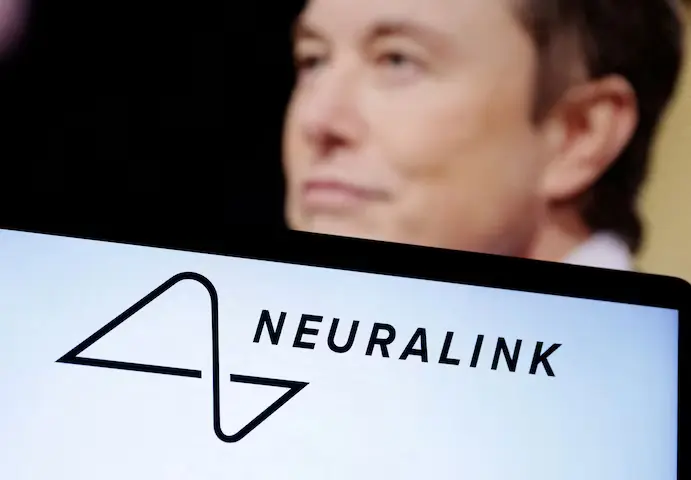Game-Changing Breakthrough! Neuralink Gets Green Light for Revolutionary Human Trials by FDA!
Neuralink, the brain-implant company founded by Elon Musk, has announced that it has received regulatory approval to conduct its first clinical trial involving humans. This milestone approval from the U.S. Food and Drug Administration (FDA) is a significant step forward for Neuralink, which has been developing a revolutionary device that can be surgically inserted into the brain by a robot. The device is capable of decoding brain activity and establishing connections with computers. While the company has previously conducted research exclusively on animals, this approval paves the way for human trials.
Excited about this development, Neuralink took to Twitter to share the news, stating, “We are excited to share that we have received the FDA’s approval to launch our first-in-human clinical study! This is an important first step that will eventually allow our technology to help numerous individuals.” Musk, expressing his joy, retweeted the post and congratulated his team for their achievement.
At the time of writing, neither the FDA nor Neuralink has provided further comments on this approval.

Neuralink’s Previous Regulatory Approval Claims
It’s worth noting that Musk has made premature claims about regulatory approval in the past. In 2017, he tweeted about receiving “verbal govt approval” for an underground Hyperloop project from New York to DC through his tunneling firm, The Boring Company. However, officials at the time neither confirmed nor provided any direct evidence to support Musk’s statement. It became evident that formal measures to approve such a project had not been taken.
An Introduction to Neuralink
Established in 2016, Neuralink is a privately held company headquartered in Fremont, California, with a sprawling, under-construction campus near Austin. The company boasts over 400 employees and has raised a substantial amount of funding, with at least $363 million invested, according to PitchBook data.
With Musk’s backing, Neuralink has gained remarkable resources and investor attention in the field of brain-computer interface technology. This field focuses on the development of electronic implants that can decode brain activity and communicate it with computers. Such advancements hold the potential to restore functionality for individuals with conditions like paralysis and amyotrophic lateral sclerosis. Notably, companies like Blackrock Neurotech and Synchron have already implanted their devices in individuals for clinical trials, and over 42 people worldwide have received brain-computer implants. These devices have enabled extraordinary achievements that were once confined to the realm of science fiction, such as a paralyzed man fist-bumping Barack Obama using a robotic hand, an ALS patient typing by simply thinking about keystrokes, and a tetraplegic patient managing to walk with a slow but natural stride.
While most companies in this industry primarily focus on addressing medical needs, Neuralink has grander ambitions: creating a device that not only restores human function but also enhances it. In April, the company tweeted, “We want to surpass able-bodied human performance with our technology.”
The Brain Chip Technology of Neuralink
Neuralink has designed a computer chip embedded with electrodes, intended to be surgically attached to the surface of the brain. To perform the implantation procedure, the company has developed a robotic device. Musk envisions a scenario where these devices can be regularly upgraded, similar to how individuals upgrade their smartphones. During a late November event, Musk expressed his optimism, stating that Neuralink would commence human trials within six months.
While achieving a clinical trial involving humans is a significant milestone, it does not guarantee regulatory or commercial success. Neuralink, like other companies in the field, will face intense scrutiny from the FDA to ensure the safety and reliability of their devices. Additionally, ethical and security questions arise concerning a technology that could provide a cognitive advantage to those with brain implants.
The Timeline for Human Clinical Trials
The exact timeline for when the clinical trials will begin remains uncertain at this point.
The brain-computer interface venture represents one of Musk’s most ambitious endeavors within his vast business empire, which includes electric cars, space exploration through SpaceX, generative artificial intelligence, and now social media. Earlier this year, Musk established X.AI, a company aimed at competing with tech giants Microsoft and Google in the realm of large language-model chatbots capable of answering a wide range of inquiries.
Despite his numerous commitments, Musk has been devoting a considerable amount of time to Twitter, the social media platform he acquired for $44 billion last year, with a promise to uphold “free speech.” Managing his demanding schedule, Musk frequently travels by private jet, visiting Tesla factories, SpaceX launch sites, and fulfilling speaking engagements for Twitter. He even manages to visit the company’s Bay Area headquarters, sometimes accomplishing all of these tasks in a single week. Recently, Musk appointed advertising executive Linda Yaccarino as CEO of Twitter, allowing him to delegate some of the responsibilities associated with overseeing the social media platform that has experienced upheaval since his takeover.
Neuralink’s FDA approval for their first human clinical trial marks a significant advancement for the company and the field of brain-computer interface technology. With the potential to restore and enhance human functionality, Neuralink’s innovative brain implants hold immense promise for improving the lives of individuals with various medical conditions. While the exact timeline for the trials remains uncertain, this approval brings us one step closer to a future where the boundaries between humans and computers continue to blur.
